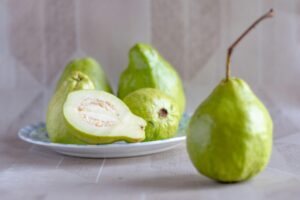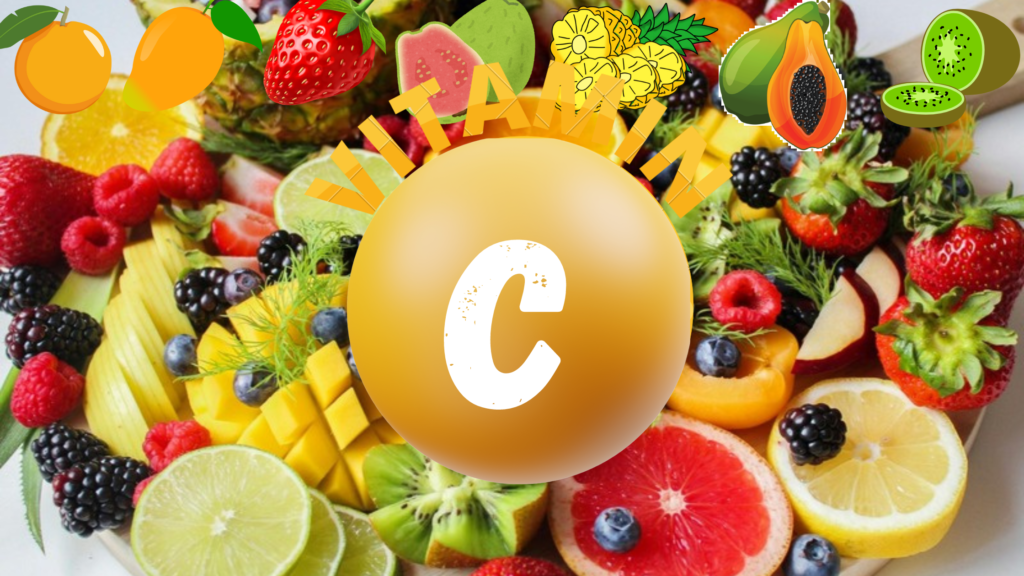Vitamin C, also known as ascorbic acid, is a vital nutrient that plays a crucial role in maintaining your overall health. It supports immune function, aids in the absorption of iron, promotes healthy skin, and acts as a powerful antioxidant. While vitamin C can be found in various supplements, consuming it through natural sources is often more beneficial due to the additional nutrients and fiber that whole foods provide. One of the best ways to ensure you’re getting enough vitamin C is by incorporating a variety of fruits into your diet. In this comprehensive guide, we’ll explore some of the best Vitamin C-Rich Fruits, their health benefits, and how to enjoy them in your daily meals.
1. Why Vitamin C is Essential
1.1 Health Benefits of Vitamin C
- Boosts Immune Function: Vitamin C is known to enhance the production of white blood cells, which are crucial for fighting infections.
- Antioxidant Protection: It acts as a powerful antioxidant that helps protect cells from damage caused by free radicals.
- Skin Health: Vitamin C is vital for the synthesis of collagen, a protein that helps keep your skin firm and youthful.
- Iron Absorption: It improves the absorption of non-heme iron from plant-based foods, which is essential for preventing anemia.
1.2 Recommended Daily Intake
The recommended daily intake of vitamin C varies by age, sex, and life stage. For most adults, the recommended daily intake is:
- Men: 90 mg per day
- Women: 75 mg per day
- Pregnant Women: 85 mg per day
- Breastfeeding Women: 120 mg per day
2. Top Fruits High in Vitamin C
2.1 Oranges

Nutritional Profile:
- Vitamin C Content: Approximately 53.2 mg of vitamin C per 100 grams.
- Other Nutrients: High in fiber, vitamin A, and antioxidants.
Benefits:
- Immune Boost: Oranges are a classic source of vitamin C, which helps in boosting your immune system and fighting off common illnesses.
- Heart Health: The antioxidants in oranges can help lower cholesterol levels and reduce the risk of heart disease.
- Digestive Health: The fiber content aids in digestion and helps maintain a healthy gut.
How to Incorporate:
Enjoy oranges fresh, as juice (preferably without added sugars), or add them to salads and smoothies.
2.2 Kiwifruit

Nutritional Profile:
- Vitamin C Content: Approximately 92.7 mg of vitamin C per 100 grams.
- Other Nutrients: Rich in vitamin K, vitamin E, and dietary fiber.
Benefits:
- High Vitamin C: Kiwi is exceptionally high in vitamin C, which can significantly boost your immune system.
- Antioxidant Power: It contains a range of antioxidants that help combat oxidative stress and inflammation.
- Digestive Health: Kiwi is known for its digestive benefits due to the enzyme actinidin and its fiber content.
How to Incorporate:
Eat kiwi fresh, add it to fruit salads, or blend it into smoothies. Kiwi can also be used as a topping for yogurt or desserts.
2.3 Strawberries

Nutritional Profile:
- Vitamin C Content: Approximately 58.8 mg of vitamin C per 100 grams.
- Other Nutrients: High in fiber, antioxidants, and folate.
Benefits:
- Immune Support: Strawberries provide a substantial amount of vitamin C to help enhance your immune defenses.
- Anti-Inflammatory: The antioxidants in strawberries can help reduce inflammation and oxidative stress.
- Skin Health: Vitamin C in strawberries promotes collagen production, which supports healthy skin.
How to Incorporate:
Enjoy strawberries fresh, add them to cereal or yogurt, or blend them into smoothies. They are also delicious in desserts and salads.
2.4 Pineapple

Nutritional Profile:
- Vitamin C Content: Approximately 47.8 mg of vitamin C per 100 grams.
- Other Nutrients: Rich in bromelain, vitamin B6, and manganese.
Benefits:
- Digestive Health: Pineapple contains bromelain, an enzyme that helps with digestion and reduces inflammation.
- Immune Boost: The vitamin C content supports immune function and overall health.
- Hydration: Pineapple has a high water content, which helps keep you hydrated.
How to Incorporate:
Enjoy pineapple fresh, add it to fruit salads, or use it in smoothies and savory dishes.
2.5 Guava

Nutritional Profile:
- Vitamin C Content: Approximately 228 mg of vitamin C per 100 grams.
- Other Nutrients: High in dietary fiber, vitamin A, and folate.
Benefits:
- Exceptional Vitamin C Source: Guava is one of the richest sources of vitamin C, making it a powerhouse for immune support.
- Digestive Health: The high fiber content aids in digestion and helps maintain bowel regularity.
- Skin Health: Guava supports collagen production and can improve skin texture and appearance.
How to Incorporate:
Eat guava fresh, add it to fruit salads, or blend it into smoothies. Guava can also be used in juices and desserts.
2.6 Mango

Nutritional Profile:
- Vitamin C Content: Approximately 36.4 mg of vitamin C per 100 grams.
- Other Nutrients: Rich in vitamin A, vitamin E, and dietary fiber.
Benefits:
- Immune Support: Mangoes provide a good amount of vitamin C to help strengthen your immune system.
- Antioxidants: The antioxidants in mangoes help protect cells from damage and support overall health.
- Digestive Health: Mangoes contain dietary fiber that aids in digestion and helps prevent constipation.
How to Incorporate:
Enjoy mango fresh, blend it into smoothies, or add it to fruit salads and desserts.
2.7 Papaya

Nutritional Profile:
- Vitamin C Content: Approximately 61.8 mg of vitamin C per 100 grams.
- Other Nutrients: High in vitamin A, folate, and digestive enzymes like papain.
Benefits:
- Immune Boost: Papaya is rich in vitamin C, which helps enhance immune function and combat infections.
- Digestive Health: Papain, an enzyme in papaya, aids in digestion and reduces bloating.
- Skin Health: The vitamin C and vitamin A in papaya support healthy skin and reduce signs of aging.
How to Incorporate:
Eat papaya fresh, blend it into smoothies, or add it to fruit salads. Papaya can also be used in savory dishes and salsas.
3. Tips for Maximizing Vitamin C Intake
3.1 Eat a Variety of Fruits
Incorporate a range of vitamin C-rich fruits into your diet to ensure you get a diverse array of nutrients and benefits.
3.2 Opt for Fresh or Frozen Fruits
Choose fresh or frozen fruits over processed options to retain the highest vitamin-C content. Avoid fruit juices with added sugars or those that may have lost some nutrients through processing.
3.3 Store Properly
Store fruits in a cool, dry place or refrigerate them to preserve their vitamin-C content. Overexposure to light and heat can reduce vitamin-C levels.
3.4 Combine with Other Nutrients
Pair vitamin C-rich fruits with other nutrient-dense foods for a balanced diet. For example, add citrus fruits to salads with leafy greens or pair strawberries with yogurt.
4. Sample Meal Plan Featuring Vitamin C-Rich Fruits
Breakfast
- Smoothie: Blend 1 cup of fresh spinach, 1 kiwi, 1/2 cup of pineapple chunks, and 1/2 cup of Greek yogurt with a splash of orange juice.
- Side: A bowl of mixed berries (strawberries, blueberries, and blackberries).
Lunch
- Salad: Mixed greens with sliced mango, avocado, cherry tomatoes, and grilled chicken. Dress with a light vinaigrette.
Snack
- Fruit Bowl: Sliced guava, orange segments, and a few strawberries.
Dinner
- Grilled Salmon: Served with a side of quinoa and a fruit salsa made with diced papaya, pineapple, and red onion.
5. Conclusion
Vitamin-C is an essential nutrient that supports immune function, skin health, and overall well-being. Incorporating a variety of fruits rich in vitamin-C into your diet is a delicious and natural way to meet your nutritional needs. Oranges, kiwifruit, strawberries, pineapple, guava, mango, and papaya are among the top choices for boosting your vitamin-C intake and reaping the health benefits they offer.
By enjoying these fruits regularly and using them creatively in your meals, you can enhance your health and enjoy the delicious flavors of nature’s vitamin C-rich fruits offerings. Embrace these fruity favorites and experience the positive impact they can have on your vitality and well-being.
If you too want to learn about 7 Highest Protein-Rich Fruits and get valuable tips, visit https://farming.org.in/7-highest-protein-rich-fruits-with-protein-content/


